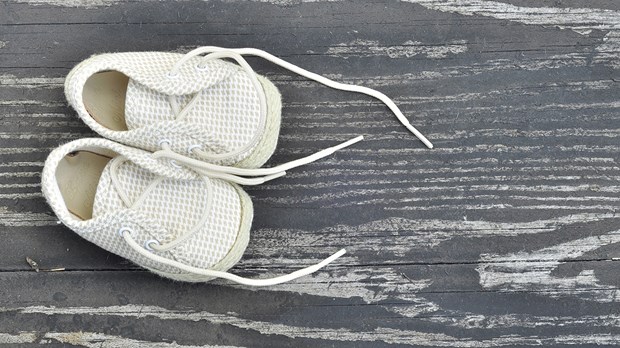Why Doesn't God Answer My Prayers?

I stood over my three-week-old son’s bassinet, hearing the dozens of monitors beep and watching the nurses check for any signs that he was recovering. The call I prayed I’d never receive came at 2 A.M. as I slept fitfully in my hotel room.
“Come quickly,” our nurse said, her voice shaking. “Kaden is crashing.”
Driving to the children’s hospital was a blur, but I remember sobbing through my prayers for God to heal my son, to let him live. I’d already watched my twins die in my arms a little over a year before. He couldn’t let this happen again.
I prayed over Kaden every day of his life. So did thousands of others. On the night he crashed, a hospital chaplain I didn’t know came to pray with us, and I felt a sort of panic about it: What did he believe? Did he understand how important our child was to us? Would he ask God for the right things?
My mind spiraled into ways to get prayer to work better. Perhaps we needed more people praying, and specifically more powerful people praying. A thought crossed my mind that if someone could reach out to Billy Graham—or the pope—their prayers would surely heal my little boy.
Instead, I lost my baby boy.
Prayer vs. Reality
My thoughts on prayer had changed dramatically in just a few years. Before I lost my twin sons at 20 weeks, I waited a week in the hospital trying to get them to viability before they were born. My water broken, infection a risk, and my life in turmoil—my prayers were made of complete terror for what I understood would probably happen. My sons were too little to survive, and outside the womb would be even harder on them. I remember lying in the hospital bed with tears pouring down as I begged God for a miracle, offering him a multitude of my human abilities if he answered yes.
They lived for three hours and three minutes after being born.
I remember leaving the hospital with a feeling of shame that was almost as profound as my grief. How dare I believe in something like a miracle when it was so obvious that one wasn’t going to happen? It was as if the faith I’d known and trusted had been shattered into a million pieces in that hospital room. I wasn’t sure how to approach what had happened, or how to talk about what I felt was an unanswered prayer—one that left me with PTSD and off-the-charts depression and anxiety.
Others have felt this similar desperation too. “I’d prayed for so many other people’s babies. When I finally got a chance to be a mother, I guess I expected God’s grace to grant me all the chances in the world to watch my son grow,” says a pediatric nurse named Lori Rapoff. “To have that time cut short to just 27 days and lose a child to SIDS, with absolutely no medical answers, was heartbreaking to say the least. I felt like I prayed and used my own abilities to help other babies and mine was taken away for no reason at all.”
What can we do—how can we keep on praying—when God doesn’t seem to answer our most desperate pleas?
Andrea Sterling, a mother of three babies, only one of whom is living, described the problem of unanswered pray in a way that deeply resonated with me, saying, “I think as Christians we feel like unanswered prayer is a taboo topic—not that it’s unanswered, but that it’s not the expected results.”
What If Prayer Isn't Good Enough?
Kaden’s death shook my entire foundation of prayer. I believed, even after they pronounced him gone, that God would somehow give us a miracle. I’d done everything right. There were so many prayers for him! Surely God couldn’t let me down . . . again.
As time passed and reality set in, I felt more and more uncertain of how to pray or why I should even pray at all. When I’d asked God to heal Kaden, the answer he gave me was no. This no turned into a questioning of my faith. Perhaps it hadn’t been enough. Perhaps God didn’t hear my prayers. Maybe I wasn’t good enough to deserve a yes.
Jenn McKinley Lewis had two miscarriages in between having two healthy daughters. “At times I have caught myself wondering what the point of prayer even is,” Jenn admits. “If God has his plans, then does prayer truly change anything? Can we really change God’s mind when we pray? Or is he already planning to do what we are praying for, regardless if we pray the words out loud?” With so many differing answers in our community of believers, it’s no wonder we often feel this way.
My Very Best Prayer
I often see people approach prayer in a way that reminds me of a child awaiting a magic trick: if you guess the right card or yell out the best answer, you’re rewarded with something fun. Then it’s time to tell everyone what you did right in order to get your yes.
While there are many areas in my life in which God has said yes, it’s still so hard to hear answered prayers being talked about in a way that seems to credit the prayers and the pray-ers as having done something right. At times I feel embarrassed about the outcome of my own desperate prayers, and I shy away from offering prayer for others. After all, isn’t it obvious my prayers aren’t going to work?
Because of these feelings, there are times I can’t imagine praying with or for anyone. Fears flood my mind: What if nothing happens again? What if it does for them—and yet it didn’t for me?
Shannon Stephan Rodriguez echoes the private thoughts of so many of us who have faced the unfathomable “no” time and again. “I actually began thinking along the lines of, if I don’t pray, if I don’t ‘believe’ or ‘have faith’ in a certain outcome, then I can’t be disappointed,” she explains.
How often does this still cross my mind as I face even simple life complications now? Don’t get your “God hopes” up—look what’s happened before.
It Is Well
So why do we pray? That’s the question that has haunted me for years. If the amount of prayer, or the person praying, isn’t going to at least sway God to consider a miracle, why bother with it? Isn’t it easier to simply accept that whatever will be, will be?
In the years that have followed losing my sons, failed adoptions, and a host of other issues, I’ve begun to learn that prayer wasn’t actually created so I could get what I want. Prayer isn’t to get my way or to sway God into a direction he didn’t consider.
Lori Mullins Ennis, editor of Still Standing Magazine, battled years of in vitro fertilization to get to full term with her son, only to lose him unexpectedly a few hours after his birth. Now as a mom to a little boy on earth and another son in heaven, she shares words of wisdom a friend passed on to her: “Communication in relationships is so crucial, as we know with husbands or friends. And well . . . if we are not talking to God, there’s no relationship. [We’re not] hearing what he has to say or experiencing the release of telling him what we have to say.” Prayer is the most relational thing we can do with our Creator—that’s why we do it.
Thy Will Be Done
When Jesus taught us how to pray, he didn’t tell us to include someone more spiritually in touch, or to even ask for anything specific. He blessed God and asked for his will to be done here and in heaven (Matthew 6:9–13).
As I’ve journeyed through loss, prayer has become a way to lead me and my broken, human perspective into God’s perfect will. It guides my heart to a place where I can wait on what God has ordained with less anxiety or guilt. As much as I still struggle with prayer, I know that the change it can make is often the one in me—not simply in my life or my circumstances.
While I still pray for miracles, healing, and answers, my soul is able to look back at the past and forward at our future and know that it truly is well.
Cyndi Schultz has come to a similar conclusion. It was her deep faith in God that kept her going even when her twins were born at just 23 weeks. Her outlook on prayer changed, however, when she and her husband had to make the decision whether to continue life support in the first week of the boys’ lives. “[That’s when] I knew I had it wrong the whole time,” she says. “I wasn’t living in a predestined plan of God’s playing out in front of me—God was sad with me, weeping with me as he welcomed my sons into his arms in heaven. I am his child too, and he is sad when I am sad.” Now raising twin girls, Cyndi sees her life through the eyes of Christ. “This is why I will only just smile politely when someone suggests something is ‘all part of his plan.’ Because for me, the only plan there is is me living in his promise of eternal love.”
I still struggle with prayer. I struggle with the earthly plan I thought I was destined to live. I struggle with my views of a God who would save me from deep pain if I did enough. But, my view has changed. I no longer believe in “enough” or “right” prayers anymore. I believe in my relationship with a Savior who also suffered, who suffers with me now, who also wasn’t spared of the pain of being human. I believe that he has “plans to give [me] hope and a future,” although that path may hurt more than I ever dreamed (Jeremiah 29:11, NIV). I don’t know if my pain and suffering will have an ending here on earth, but I do know that one day I will see what came of it.
My prayers and my life are for the glory of God, no matter the circumstances or the outcome. This isn’t about me; it’s all about him. And in my heart and soul, I know that he makes everything beautiful in its time.
Diana Stone blogs at Diana Wrote about her daughter, three sons in heaven, and a surprise baby girl due in October. She’s a teacher turned homeschooler, army wife, and writes extensively on her faith in the midst of struggles. You can find her work on Babble, She Reads Truth, and Still Standing Magazine, with smaller glimpses into her day on Twitter, Facebook, and Instagram.
Read more articles that highlight writing by Christian women at ChristianityToday.com/Women
 Read These Next
Read These Next

 How to Beat BurnoutLattes and power naps will only get you so far.
How to Beat BurnoutLattes and power naps will only get you so far. Zombies Are for RealAfter diving into Scripture this fall, I’ve found there’s more to the zombie craze than what’s on TV—essentially, the truth of Christ's resurrection.
Zombies Are for RealAfter diving into Scripture this fall, I’ve found there’s more to the zombie craze than what’s on TV—essentially, the truth of Christ's resurrection.
 The Ministry of Tough ConversationsWhen God calls you to lead, he also calls you into conflict.
The Ministry of Tough ConversationsWhen God calls you to lead, he also calls you into conflict.








 Homepage
Homepage